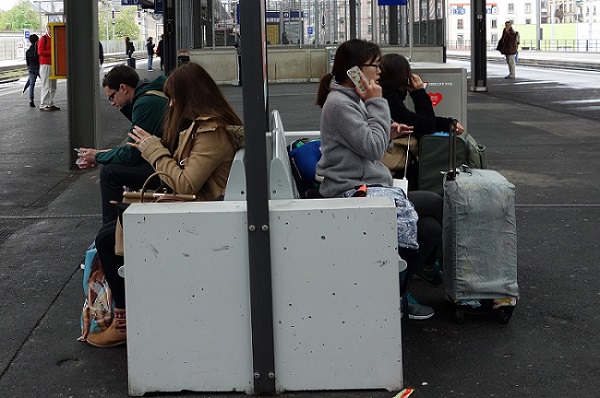The 2016 Credit Suisse Youth Barometer illustrates how the growing variety of goals in life and the more and more widespread use of smartphones and apps are increasingly turning young people into a “stress” generation. The survey also shows that politics on the web works: The fact that political issues can be commented on and discussed online is viewed positively.
The young people surveyed in Switzerland, the US, Brazil, and Singapore want to have it all in life: a career, but with a good work-life balance; to be independent and to work at an international company; to save less, but also own their own home. And with all activities, they are constantly online, communicating with each other, consuming news, playing games, and discovering new apps. This leads to the conclusion that young people today are turning into a “stress generation.”
Politics on the Web Works
Apart from in Singapore, young people’s interest in politics is growing in all the countries surveyed. At the same time, politicians around the world are trying to reach young people more intensively than ever through the internet and social media. A majority of respondents sees it as positive that political issues can be commented on and discussed online: They view this as a benefit for politics. However, young people are also aware of the negative side of the virtual world – above all with regard to so-called “shitstorms” and potentially manipulated political content on Facebook and Twitter. Having said this, there is broad agreement, especially in the US and Brazil, with the statement “Facebook, Twitter, and online comments make politics more interesting and motivate users to become more politically engaged.”
Worries about Unemployment, Terrorism, and Healthcare Issues
In the US, unemployment, terrorism, and healthcare are the most widespread issues. Somewhat contrary to their reputation, young Americans are adapting less quickly to new technologies than their counterparts in Switzerland, for example: Lively use is still made of text messaging, while WhatsApp has barely established itself. Snapchat is also described as less “in” there than in Switzerland.
In Brazil, corruption and unemployment are mentioned by over two-thirds of young people; neither topic appears in the top five in Switzerland. Various results suggest that young people from the South American country have a great interest in digital technologies.
In Singapore, respondents cited inflation and health issues as the second and third most important problems facing their country. The top issue is terrorism. Fear of attacks has increased markedly in recent years: In 2013, this was identified as a problem by just 11% of respondents; nowadays it’s 38%.
Overview: The Ten Most Important Insights from the 2016 Credit Suisse Youth Barometer
- Unemployment remains one of the main concerns: The tense economic climate in recent years is also reflected in the Youth Barometer. Job concerns are one of the most frequently cited problems in all countries except for Switzerland.
- Fear of terrorism is growing: The many attacks around the world have increased fears of terrorism. In Singapore it comes first, in the US second, and in Switzerland sixth in the worry ranking list. While 13% of Swiss citizens described terrorism as a major problem back in 2010, this has now risen to 23%.
- Optimistic view of the future: Despite their concerns, the young people surveyed, who were born between 1991 and 2000, view the future with optimism, although somewhat less than in earlier years. Swiss youngsters display the most optimism (59%). The majority of the youth in Brazil (54%) also expects things to turn out well – but this is down from 67% in 2010. Fifty-two percent are of this opinion in the US and 43% in Singapore.
- Credibility of the web decreasing: A large majority is aware that postings on Facebook, Twitter, and the like can be manipulated. And only a minority believes these comments to be honest and genuine (exception: Singapore). There is awareness everywhere that there are so-called trolls on the web, whose intentions are not honest.
- Widespread experience of cyber-mobbing: Many of those surveyed reported negative experiences on the internet. 40% in the US, 39% in Switzerland, 33% in Singapore, and 26% in Brazil claimed to have been harassed or even mobbed on Facebook.
- Snapchat on the rise: While text messaging is continuing to gain importance in the US and Singapore, it only remains in use by a minority in Brazil and Switzerland. New favorite: Snapchat. Fifty-two percent of those surveyed already make use of the communication service in Switzerland.
- Saving for home ownership: Home ownership is the greatest financial desire in all countries. And the low interest environment of the last few years has left its mark. If given 10,000 units of their national currency, the young people would pay less into their savings account than in 2015. Instead, putting money aside to buy a home, buying equities and funds (US, BR, SG), going on vacation (BR, SG, CH), and investing in the family (US, BR, SG) are popular desires.
- Many goals in life: Those surveyed have many goals in life, some of which are also contradictory. The following are supported by over 50% in all countries: “a good work/life balance,” “pursuing one’s own dreams,” “home ownership,” “developing one’s own talents,” “trying out different things,” “pursuing a career,” “family with children,” “getting to know many countries and cultures.”
- Self-employment is a frequent career aspiration: Questioned about their preferred employer, many young people say they would like to be self-employed. One exception is Switzerland where self-employment is not sought after so broadly. The most popular employers are: 1. Google, 2. SBB, 3. Novartis, 4. Roche, 5. Credit Suisse. The home office is increasingly gaining in popularity: Apart from in Singapore, where working from home has for a long time been most popular, considerably more of those surveyed consider this option to be important than in 2015 in all the countries surveyed.
- Established religions continuing to lose ground: Between 22% and 34% of those surveyed describe themselves today as agnostic/atheist/undenominational. Just two years ago it was between 5% and 13%. The established religions are therefore losing ground among those surveyed despite still attracting majorities.
The detailed analyses of the study, including information graphics, can be found at the following link.

